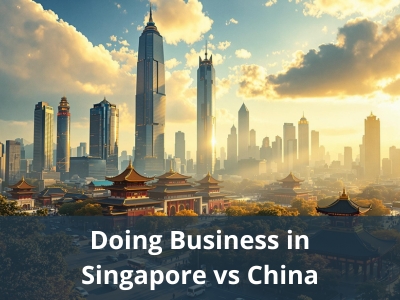Doing Business in Singapore VS China – A Comparison
 Entrepreneurs and investors looking to establish or expand their businesses in Asia often face a tough decision: Should they choose Singapore or China? Both countries offer unique advantages that make them attractive business destinations. Singapore is renowned for its competitive business environment, high quality of life, and cost-effectiveness for smaller businesses. Meanwhile, China boasts a massive consumer market and rapid economic growth. This article explores the key factors to help you make an informed decision.
Entrepreneurs and investors looking to establish or expand their businesses in Asia often face a tough decision: Should they choose Singapore or China? Both countries offer unique advantages that make them attractive business destinations. Singapore is renowned for its competitive business environment, high quality of life, and cost-effectiveness for smaller businesses. Meanwhile, China boasts a massive consumer market and rapid economic growth. This article explores the key factors to help you make an informed decision.
Key Comparison Points
Business Environment
- Singapore: Politically stable, transparent legal framework, pro-business government policies. Learn more about about 3E Accounting and its commitment to supporting businesses.
- China: Rapid economic growth, evolving legal framework, government-driven initiatives for foreign investment.
Taxation
- Singapore: Corporate tax rate of 17%, attractive tax incentives, no capital gains tax. Benefit from Singapore incorporation services tailored to optimize your tax structure.
- China: Corporate tax rate of 25%, regional tax incentives, capital gains tax applies.
Ease of Company Incorporation
- Singapore: Streamlined incorporation process, robust digital infrastructure, minimal bureaucracy. Explore guide to Singapore company registration for a seamless setup experience.
- China: Lengthy incorporation process, complex regulatory environment, need for local partnerships in some sectors.
Cost of Living and Business Operations
- Singapore: Moderate operational costs, competitive office space pricing, high but manageable living expenses. Take advantage of business registered address solutions to reduce costs.
- China: Varies by region, lower operational costs in smaller cities, high living costs in major cities like Beijing and Shanghai.
Access to Markets
- Singapore: Excellent global connectivity, numerous free trade agreements, strategic location in Southeast Asia. Get expert assistance with Singapore nominee director services to meet regulatory requirements.
- China: Access to a massive domestic market, strong trade relationships, growing international presence.
Quick Comparison Overview
Here’s a quick overview of the key differences for easy reference:
| Factor |
Singapore |
China |
| Business Environment |
Politically stable, pro-business policies |
Rapid economic growth, evolving legal framework |
| Corporate Tax Rate |
17% |
25% |
| Capital Gains Tax |
None |
Applicable |
| Ease of Incorporation |
Streamlined and digital |
Complex and lengthy |
| Business Costs |
Moderate |
Varies by region |
| Market Access |
Global connectivity, FTAs |
Massive domestic market |

Benefits of Choosing 3E Accounting
Whether you’re looking to register a company in Singapore or start a business in Singapore, 3E Accounting offers unparalleled expertise and support. From seamless incorporation to comprehensive business solutions, our team ensures a hassle-free experience for entrepreneurs and investors.
Explore our Singapore company incorporation services package to understand how we can assist you. For more guidance, check out our guide to register a company in Singapore. Ready to take the next step? 3E Accounting is here to help. Contact us today to get started.
Ready to Expand into Singapore? Choose 3E Accounting Today!
Stay Secure, Stay Successful With 3E Accounting Services
Contact Us Now
Frequently Asked Questions
Singapore provides a streamlined and digital incorporation process, while China’s process is lengthier and more complex. Learn more about company registration in Singapore.
Singapore has a low corporate tax rate of 17% and no capital gains tax, while China has a corporate tax rate of 25% and applicable capital gains tax.
In addition to incorporation, 3E Accounting offers our services, including corporate secretarial, tax filing, and accounting.
Abigail Yu oversees executive leadership at 3E Accounting Group, leading operations, IT solutions, public relations, and digital marketing to drive business success. She holds an honors degree in Communication and New Media from the National University of Singapore and is highly skilled in crisis management, financial communication, and corporate communications.



 Entrepreneurs and investors looking to establish or expand their businesses in
Entrepreneurs and investors looking to establish or expand their businesses in 